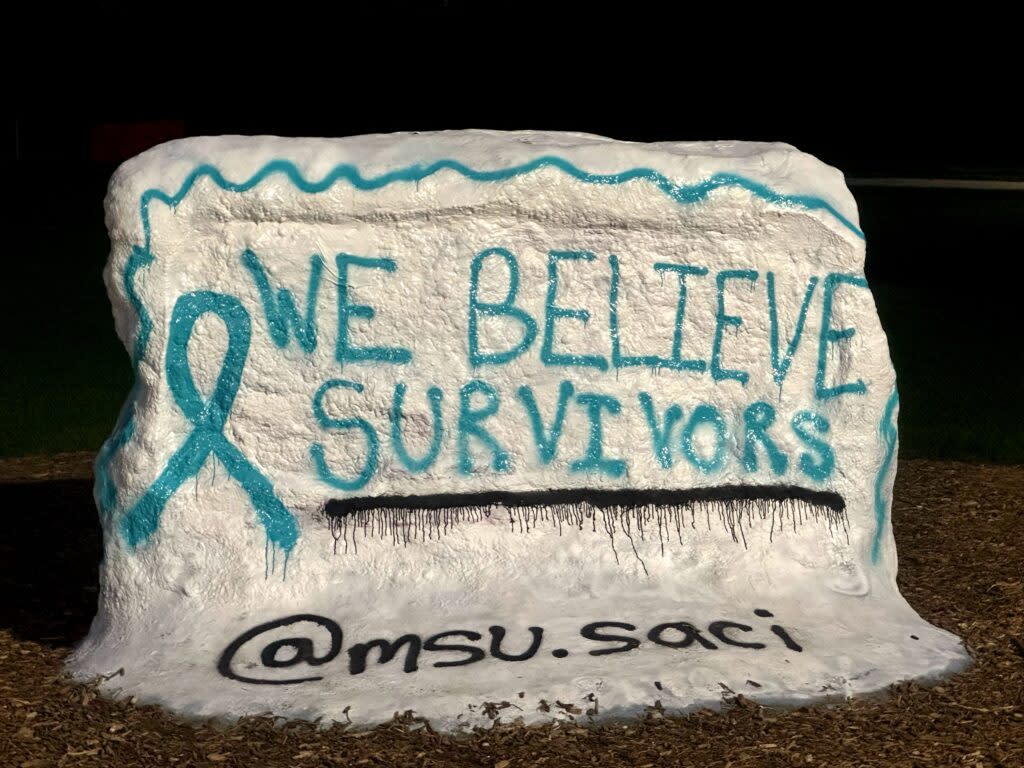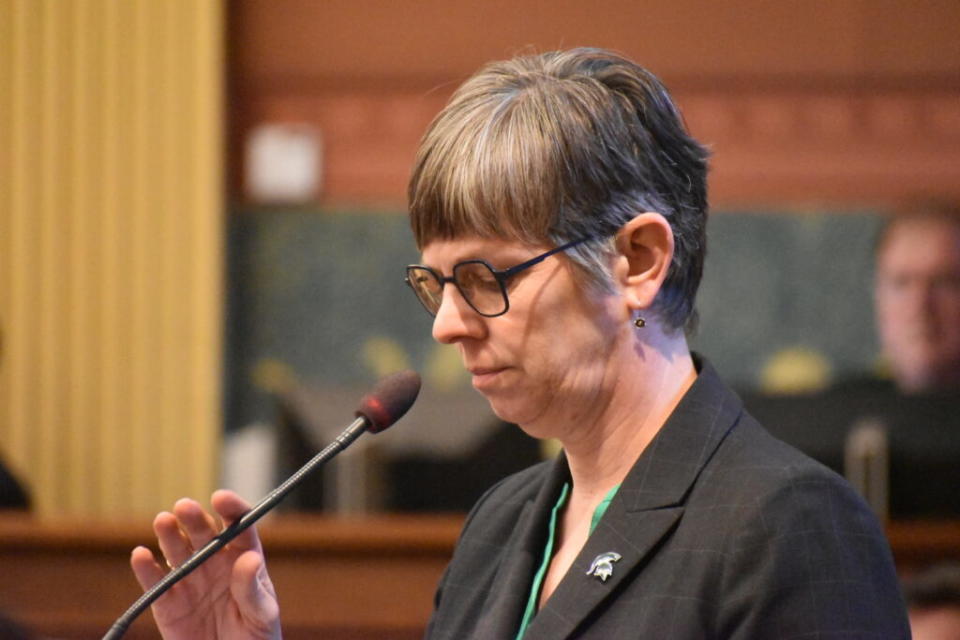Michigan House passes sexual abuse crimes bills, leaves key parts behind

The rock at Michigan State University, Sept. 16, 2023 | Susan J. Demas
Portions of long-left-behind bills expanding the statute of limitations on reporting sexual assault and removing governmental immunity from civil cases involving public schools and colleges that fail to address sexual violence passed the Michigan House during the marathon session last week.
It’s been a fight to progress these “Nassar bills,” state Rep. Julie Brixie (D-Meridian Twp.) told the Michigan Advance just before 3 a.m. after HBs 4485, 4486 and 4487 passed largely along partisan lines with Democratic support.
Since 2017, lawmakers have introduced “Nassar bills” which are intended to prevent another tragedy like the Larry Nassar case, where more than 200 women in girls told the world how the former Team USA gymnastics and Michigan State University doctor sexually abused them during his decades long sports medicine career. Nassar was sentenced to essentially three life sentences from federal court and two state courts between 2017 and 2018 on criminal sexual conduct charges and child pornography charges.
Some Nassar bills have gained the governor’s signature over the past four legislative sessions since the sentencings. But some, like the bills Brixie is spearheading now have been left behind year after year.
“It feels really good that we got this far. We got a lot of work to do. It’s an important first step. We’ve learned a lot and there’s been a lot of people helping with this along the way,” Brixie said.
Michigan State University is within her district and as an alumna, she said she’s ready to see the justice system better serve survivors of abuse and for institutions to not be able to hide behind immunity when they ought to be held accountable.
But the bills that did pass the House and will need to clear the Senate before being considered by the governor have been altered since their introduction, taking key provisions out of some and setting hurdles for passage in others.
When introduced, HB 4485 proposed a change that would have eliminated time limits for Michiganders to report felony criminal sexual conduct (CSC) and seek criminal prosecution against perpetrators. Several states have removed statute of limitations to report felony sex crimes, according to the Rape, Abuse & Incest National Network (RAINN).
There are four degrees of criminal sexual conduct (CSC) in Michigan, starting at fourth degree, which carries up to two years in prison, and goes up to first degree, which could result in a life sentence. Only first degree CSC has no statute of limitations in Michigan. Second and third degree, which are felony offenses, set limitations for seeking criminal charges to 10 years after the offense, unless the person was a minor, and then they have until 15 years after the offense or until their 28th birthday, if that comes later.
Instead of eliminating statute of limitations on second and third degree criminal sexual conduct, a substitute to HB 4485 was added during the session on June 26 to expand statute of limitations for all second and third degree CSC to the victim’s 42nd birthday if that comes after the 15-year window.
In response to the change from no statute of limitations to an expanded statute of limitations, bill sponsor Rep. Reggie Miller (D-Belleville) told the Michigan Advance in a written statement that she hopes that the other half of the package, HBs 4482, 4483 and 4484, can be taken up for a vote soon to advance important changes in law.
“Increasing the statute of limitations well into adulthood reflects the reality of what we know about these types of crimes. In some cases, it can be years before abuse and/or assault is reported and my bill will provide survivors with the opportunity to seek justice,” Miller said
The Michigan Domestic & Sexual Violence Prevention & Treatment Board put its support of behind HB 4482-4487 when the package was introduced. With all the changes that have been made to the bills, the board can’t provide an official position on the state of the package at the current moment, board Chair Libby Pollard Hines said.
“Generally, we have supported bills that allow more victims to go through the process, but these subs are different than what the Board has reviewed,” Hines said.
The three bills in the package that did not go for a vote, HBs 4482, 4483 and 4484, would increase the statute of limitations to file civil suits for sexual violence victims to sue perpetrators. Current law gives victims three years after they realize they are a victim of a crime or their 28th birthday, if that is later. The bills would raise the statute of limitations to 10 years after the time the claim accrues, seven years after the individual realizes they were the victim of a crime, or their 52nd birthday, whichever is the longest amount of time.
Although efforts to expand the statute of limitations for civil cases seeking damages for sexual violence have been bipartisan efforts in the past, Brixie’s office said the bills are the more controversial pieces of the package, though they do believe they will pass the House when the House reconvenes after the summer break.
“The House chose to move only House Bills 4485-4487 before recessing for the summer. The three other bills in the original package would make further extensions of the statute of limitations for civil litigation based on criminal sexual assault, and therefore were the subject of more controversy. We believe that the rest will pass in the fall,” Martti Weaver, who handles constituent services for Brixie, told the Michigan Advance.
Without HB 4482, neither HB 4486 and HB 4487, which deal with Michigan’s governmental immunity shield in regards to sexual violence related civil cases, can become law as they both became tie-barred to the bill after their introduction.
HBs 4486 and 4487 would cut out provisions in Michigan’s current laws that protect the state’s public universities, colleges, or school districts and employees from being sued for damages if the institutions or their employees knew sexual violence was occuring and didn’t take reasonable action.
Many of the women and girls who gave victim impact statements in the Nassar case said they reported their abuses to police and to MSU officials and coaches, but the abuse continued.
A group of parents of the survivors of Nassar’s abuse called Parents of Sister Survivors Engage (POSSE), is continuing its years-long ask of lawmakers to hold institutions like MSU accountable for protecting their communities from predators. POSSE told the Advance in a statement that the group has been calling individual lawmakers for months to take up the entire six-bill package and the group hopes that lawmakers won’t leave the bills behind again.
“Since the 2018 case of the MSU pedophile, survivors have made some progress with legislators encouraging them to take a harder stand on child sexual abuse in our state. The Democratic House passed several bills, and we also need to pass the remaining bills on statute of limitations,” the POSSE statement said. “We have to have accountability from the institutions that create cultures in which predators exist and add deterrents. Let’s stop giving lip service to addressing this heinous issue and make Michigan safer for kids.”
GET THE MORNING HEADLINES DELIVERED TO YOUR INBOX
The post Michigan House passes sexual abuse crimes bills, leaves key parts behind appeared first on Michigan Advance.


